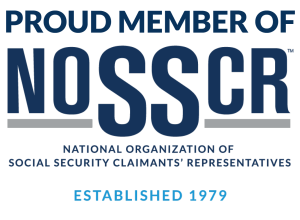The Social Security Administration administers two programs for disabled individuals: Social Security Disability Insurance (SSDI) and Supplemental Security Income (SSI). Both SSDI and SSI use the same medical standard to determine who is disabled. They differ on non-medical parts requirements.
SSDI provides benefits to disabled individuals who have enough past work to be insured for disability. While working, FICA taxes are withheld from wages. Part of those taxes is a premium for disability insurance. Generally, a person must have worked five of the last ten years before becoming disabled to be insured (a different rule applies to people under age 30). In some cases, disabled adult children and widows or widowers can receive disability benefits based on the work of a parent or their deceased spouse.
SSI makes cash payments to aged, blind, and disabled people (including children under 18) who have limited income and resources. No prior work history or contributions to an insurance fund are necessary.
Both SSDI and SSI have built in work incentives.
SSDI Work Incentives
Before the Social Security Administration decides you are disabled you can attempt to work. During the first 12 months you are disabled, if you perform what Social Security calls “substantial gainful activity” (SGA) you will most likely lose your claim. SGA is $1550 a month in 2024.
In some cases we can argue the work in the first 12 months is an Unsuccessful Work Attempt. The work must last less than 6 months and end because of your condition or because of the elimination of special services or assistance you received which you needed to work. If you are working again after applying for disability call Kirsch and Clark to discuss your work and earnings.
After the first 12 months of disability (and no work!), if you have applied for SSDI, you may be eligible for a trial work period. A trial work period is up to 9 months during which you can work and still receive a disability benefit regardless of how much you earn. If you earn $1,110 or more in gross wages in a month in 2024 that will be a trial work month. After 9 trial work months, Social Security can use your earnings as evidence you are not disabled. During a trial work month, you can earn any amount (even over SGA) and your earnings will not be used as evidence your disability has ended (but, Social Security can use other evidence, like medical records, to show your disability has ended).
SSI Work Incentives
SSI does not have a trial work period. However, SSI has other work incentives.
In 2024, the maximum monthly SSI benefit is $943. This may be reduced by countable income you receive. Countable income is things like gross wages you earn; the value of free food and/or shelter provided to you; a spouse’s earnings, other income like VA disability or retirement, pensions, Workers Compensation, unemployment benefits, etc.
SSI does not count the first $65 of earned income in a month. SSI will count half of the remaining earnings. During the first 12 months after you become disabled but before SSI is awarded, if you earn more than $1550 (in 2024) per month (gross wages), you will be denied SSI. In 2024, after SSI decides you are disabled, you can earn up to $1,949 in a month (gross wages) and still receive $1 of SSI, and be eligible for Medicaid health coverage.
This is different if you also have unearned income like SSDI benefits or household income.
An example will make this clearer. Suppose Gladys, a single person, was found disabled and eligible for SSI starting January 2024; SSI is her only income. In March 2024 she finds a part-time job which pays $1000 a month gross wage. SSI ignores the first $65 and subtracts half of the remaining earnings from the monthly SSI benefit. $1000 – $65 = $935; Half of $935 = $467.50; $943 – $467.50 = $475.50. So, in February 2023, Gladys will earn $1000 and SSI will pay her $475.50 for a total monthly income of $1475.50. She is much better off working this job than if she only had SSI.
Generally, at Kirsch and Clark, we encourage our clients to attempt to work if they can. In most cases you will be better off working than on SSDI or SSI benefits. If you attempt to work, and it is unsuccessful, it is evidence to strengthen your disability claim. However, we need to know about the work to be able to evaluate it in your individual situation. Please call to discuss your work plans with Mr. Clark.
If you earn SGA ($1550 in 2024) during the first 12 months of your disability you may potentially jeopardize your SSDI or SSI claim. If you are working you must send copies of your monthly wage stubs or other record of your work and earnings to Kirsch and Clark.
This is a complicated area of disability law. This handout does not cover all work incentives or rules regarding work and disability. Please call Kirsch and Clark if you have questions. You can also consult the Social Security web page for additional information. https://www.ssa.gov/pubs/EN-05-10095.pdf or https://www.ssa.gov/disabilityresearch/wi/generalinfo.htm
